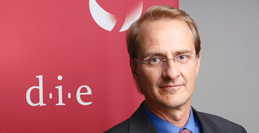Dirk Messner appointed head of the United Nations University in Bonn
Dirk Messner appointed head of the United Nations University in Bonn

Press release of 9 May 2018
Bonn, 9 May 2018. On 1 October 2018 Dirk Messner, currently Director of the German Development Institute / Deutsches Institut für Entwicklungspolitik (DIE), will assume leadership of the United Nations University - Institute for Environment and Human Security (UNU-EHS) in Bonn.
Dirk Messner has been Director of the DIE since 2003. In this capacity Messner has played a decisive and influential role in establishing the DIE as one of the world’s leading research institutes in the field of co-operation with developing countries. The number of researchers at the DIE has increased fourfold during this time. The links to the German and international research community have been significantly expanded and enhanced.
Dirk Messner explains the reasons for his move in today’s announcement: “The DIE is one of the leading development research institutes in Europe and worldwide. My decision to accept the position as head of the Bonn-based UNU Institute for Environment and Human Security has not been taken lightly. The key aspect that attracts me to the United Nations University is the global network of 13 UNU institutes, all of which work on issues of global sustainable development and provide the United Nations and international actors with knowledge-based support in addressing central problems that humanity faces. The UNU Institute in Bonn is staffed by outstanding researchers, with whom I am very much looking forward to working.”
“The Bonn location is ideal, as various institutes and the University of Bonn are currently working to establish a joint ‘Innovation Campus Bonn’ for global sustainable futures. This joint centre, at which the DIE and the UNU will also work, can establish the UN city Bonn as one of the most attractive research and education locations worldwide for global sustainability research. The Rector of the University of Bonn, Professor Michael Hoch, is a strong partner in this project. I can therefore share my experience in sustainability research and global co-operation research as well as my interest in globally-linked scientific research in support of decision-makers in the fields of politics, society and business in the tackling of urgent global problems to my work at the UNU in Bonn,” Messner continues.
Under the leadership of Dirk Messner, the DIE transformed itself into a research institute with a theory-based and application-oriented approach to researching the dynamics and challenges of global sustainable development. In particular, it focuses on comprehension of the patterns of co-operation between industrialised, emerging and developing countries, which contribute to strengthening the dynamics of global sustainable development and tackling global sustainability problems effectively.
Dirk Messner has oriented research, advising and training at the DIE towards creating knowledge in order to illuminate paths of transformation and help to make these possible: towards reducing inequality and poverty; towards decarbonisation; towards addressing the areas of conflict between protecting biodiversity and providing food security; towards the strengthening of (global) governance capacities; towards the further development of global economic governance. On the basis of this the DIE advises the Federal Ministry for Economic Cooperation and Development (BMZ) and other German government departments, as well as the European Commission and the G20.
With the establishment of new networks such as the Managing Global Governance Programme the DIE is now focused not on conducting research “into” developing and emerging countries, but, where possible and practicable, producing joint knowledge “with” research institutes from those countries. In this way the DIE is contributing to ensuring that knowledge co-operation becomes a central pillar of international co-operation for global sustainability.

